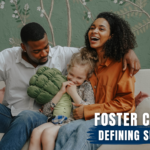
Listen to Episode 12 of the Vigilant Voices™ podcast, YOU Can Learn Even More.
Jeannine Panzera: Hello, listeners. We’re happy to have you with us for another episode of Henrico CASA’s Vigilant Voices™ podcast.
Kristin Blalock: Yes, this is almost like a ‘part two’ to our last episode because we wanted to continue our conversation on book recommendations. Last time, we focused on nonfiction, and today we’ll recommend a few fiction titles.
J: Love that. Because even when reading something that’s totally fiction, we can glean ideas that apply to our desire to help vulnerable children. And any and all resources are useful to us in our attempts to know about the challenges facing children and families in order to ensure that no child continues to face abuse, neglect, or trauma.
K: Definitely. Nonfiction stories can be really heavy because they’re true and you know that they happen, and you feel that weight. So sometimes I find I’m better able to digest an issue or a concept when it’s explored through a fictional story.
J: Yeah, like maybe not feeling quite as wound up, because I do get wound up.
K: So here’s a CASA case that did make me feel really wound up. This is the story of sweet Baby Rose. Her CASA volunteer was assigned to her when she was just an infant. Ugh… sometimes I hate saying these things… She was suffering from broken bones and a bruised eye socket at the hands of her father, and so her biological father was temporarily in jail. But the court, social services, and CASA’s staff were still concerned about the relationship between Baby Rose’s mother and her father for when he got out of jail. Like many victims of domestic or intimate partner violence, initially, Baby Rose’s birth mom kind of minimized the father’s abusive actions and intended to reunite with him when he was released. And so due to the severe domestic violence concerns regarding the baby’s future safety, Rose was removed from her home.
J: Yeah. The stories of domestic violence, they can be really difficult to hear, and it’s a cycle. And the helplessness that victims feel and that feeling of being stuck in this dangerous relationship really can bring out a lot of emotions.
K: Yeah, it can. And actually, the fiction book that I was going to recommend today is about domestic violence. The book is called Behind Closed Doors by B. A. Paris.
J: I remember this because you mentioned you had read it last year and found it really good. And you blogged about it.
K: I did. And that reminds me, listeners, you should know that our whole staff has been blogging about book recommendations this summer, just like we did last summer. So be sure to check out our blog for a whole array of books and reflections beyond the few that Jeannine and I are talking about.
J: Awesome. So back to the book. Tell me more. Like, give us a synopsis of the storyline.
K: Sure. So the book follows the story of (I’m doing air quotes) a “perfect couple.” Everyone adores this couple and looking from the outside, they have it all. Their marriage is ideal, and they are inseparable.
J: It’s kind of an interesting word, inseparable.
K: You’ve picked up on that.
J: I mean, I guess on one hand that could be romantic, but on the other hand, I don’t know, it kind of raises a red flag.
K: Right. Someone actually once pointed out to me, it was my friend’s dad, that when we see love stories, like real or made up… the most romantic gestures could also be interpreted as indicators of really unhealthy relationships.
J: Like when you break it down and think about it… like in a Hallmark movie, the guy who flies across the country on a red eye to get his girl back. So is that a sweet message of I can’t live without you, or is that actually a more concerning get back here, I’m in control.
K: Seriously. So in this book, it’s looking at things like that. Like, the husband always shows up for coffee dates between the wife and her friends, and the friends are kind of wavering. Like, is he being controlling or is this such a sweet newlywed couple that they just can’t get enough of each other?
J: Interesting. All right, so now I’m intrigued.
K: Reminder – this is fiction. I can see that you’re already worked up about this couple! So this was actually really difficult for me to read. Like, I would read a few pages and be so into it and so upset by it that then I’d take a break and walk around the room before I picked it up again.
J: How does it progress?
K: The wife is a victim of physical and emotional abuse, abuse that is extreme and was completely hidden from the outside world.
J: And that really is what’s so terrifying but also dangerous about domestic violence is that it can go on sometimes without anyone ever knowing.
K: Right. And in this book, the husband’s premeditated deceit, manipulation, and violence were beyond anything I could imagine in real life. But yet the idea that someone could so successfully isolate a victim was believable. And unfortunately, it’s believable because we do see it in many of our cases.
J: We do. And so how would then you apply this fictional story to real life? Like, what was like, the takeaway?
K: Yeah, good question. Okay, so I would say that nothing good comes from isolation. It’s the breeding ground for potential abuse. And it kind of was a reminder for me to reach out to people even when the reasons for their isolation may be legit. Just check in, don’t let them slip away. And if anything, if something is going on, you’ll be there when and if there’s a time for them to ask for help.
J: I think that’s so true and a great point. And it’s actually a point that’s often made when I hear suggestions for how to support victims of domestic violence is don’t push them. Because it has to be something that they want to share. But when they’re ready to talk or ready to leave, be ready for that.
K: 100%. Okay, so off the depressing topic of domestic violence, Jeannine, what fiction book were you going to recommend to us?
J: So I have to give a shout out to one of our volunteer coordinators, Stacy, and give her credit for this one because she recently told us about a novel that she read that actually has a character in it who is a CASA volunteer. So of course we all had to check it out.
K: I know I did. I took it to the beach and read it in, like, 48 hours.
J: Oh, wow. Okay, well, you could probably weigh in on this too. So it’s called Look for Me by Lisa Gardner, which sounds like it’s a page turner. Listener, this is a mystery with a detective who is working to solve a crime. But the background story is a family with a history of many struggles: absentee fathers, a mother struggling with substance abuse, siblings separated in the foster care system, violence, abuse, poverty. I think we can safe to say that this really has it all.
K: It does. And while it is fiction, there again, are just so many similarities to the families that we often serve at CASA. To me, what stood out, namely, is that there isn’t just one issue a family is typically dealing with, like, they’re dealing with more than one issue at one time.
J: Yeah. Wouldn’t it be a lot simpler if it was just one issue?
K: Right, yeah. No. It’s more realistic to say it’s multiple issues that compound and make for a really complex mess with no clear solutions.
J: And what’s interesting to me is that there are also many characters who are positive adults in this family’s life. People who care, who want to help. And so, Listener, if you’ve been with us for previous episodes, you know that we strongly believe that the presence of one stable, caring adult in a child’s life can make all the difference.
K: Yes. And we believe that because we see it to be true in our work with children who have experienced abuse and neglect. Having a safe adult by their side is a total game changer. But we also believe it because there’s data around this. Studies show that the number one protective factor that buffers a child from these negative outcomes associated with trauma is the presence of that one stable, caring adult.
J: And I remember what Stacy shared is that while there are caring adults in the book, the children didn’t feel comfortable talking to. So then, you know, they weren’t being honest about what was going on and what was happening to them.
K: Which is understandable and often true in real life. So much of our work with children who’ve experienced trauma is the work of building trust. That’s what we’re actually doing, showing up again and again until they realize this person here isn’t leaving me. And I might be able to start trusting them.
J: Exactly. But in real life, even when a child isn’t talking, there’s more that we can do. And so we really work to train our CASA volunteers to observe. And so I was frustrated, like, thinking about this, because the adult characters were probably missing signs of potential abuse or neglect. I think there was a statement that Stacy had shared that they would ask the children, how are things? And they’d respond, “Oh, I’m just fine.”
K: Yeah, like many children do. Because they’re clearly so scared. They have lived through being let down or hurt by adults who they thought were safe in the past…
J: Exactly. And that’s why the adults should have noticed and done something, investigated it, reported it.
K: A friendly reminder that it is fiction.
J: It sounds like it was a really good book that kind of gets you sucked into the story and the characters. But do love that about fiction. It isn’t true, but the stories can still be so relatable, and we can glean inspiring messages from these novels that we read.
K: Definitely. And when Stacy read this, she said it reminded her of the enduring strength of people, which I loved. She pointed out that in her role, she sees people strive to make something good out of the worst circumstances. And so in her real life and in this book, it just felt inspirational to her.
J: I can see that. I love that sentiment and what she took away. Even when we have difficult journeys, it can certainly turn into a testament of our strength.
K: Yeah. Or a testament to someone’s love for their family. Which was true in this book. Again, not true, because it’s fiction. And so many times true in the happy endings we’re fortunate enough to see in our work.
J: So speaking of strength and family and maybe a happy ending, let’s go back to that real life CASA story about Baby Rose that you shared.
K: Yes. Because Baby Rose did have a happy ending. Her mom decided that she was going to get that sweet baby back, and so she made regular daily contact with the foster family, and she utilized all of the services and counseling that was recommended to her. She wanted to be a better parent for that little girl. And over time, she began to really realize and understand the risks of staying in an intimate relationship with the child’s father. She realized that it was her responsibility, no one else’s, to keep her daughter safe from harm. And so she ended that relationship, and she developed a really well thought out plan with her CASA that allowed for future contact between Baby Rose and her father in a really safe way. And in the end, Baby Rose was returned to her mom, and the entire professional team was in agreement that Baby Rose would be safe and secure moving forward.
J: I love that because it certainly doesn’t always happen for all of the court professionals universally across the board to agree that a parent is ready for his or her child to return home. And so I love that in this case, the mom was praised by everyone involved for her hard work and dedication to her child.
K: Oh, definitely.
J: So after talking about these books and this case, I feel like our call to action this week should be kind of simple. Just maybe show your family some love.
K: Yeah. And let’s point out whether it be the family who raised you, the family that you’ve created and you’re raising, or maybe the family that you’ve built through friendships.
J: Absolutely. Right. Friends are family, so there are all kinds of families. So just do something to prioritize them this week and show them how much you love them.
K: Yeah. Life is better when we’re all running around with our love tanks full.








